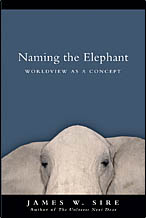
James W. Sire addresses another excellent question from Micheal Hickerson, ESN Blog Contributor:
Is there a danger that acknowledging different worldviews will lead to the position that “all truth is relative”?
Yes and No.
Yes. If in fact there are different worldviews (and indeed there are), then one way to avoid frustration in dialog between those holding divergent worldviews is to give up the notion that any worldview is more likely to be true than any other worldview. This situation has been realized in our American culture, notably on college and university campuses both in the dorms and the liberal arts and social science classrooms. Science and technology assume a determinate, objective reality. It keeps the chemistry building from exploding. It is, in other words, a fact that the presence of multiple and divergent worldviews exist in many cultures and that this has been a factor that has led to the notion that there is no way to determine which, if any of them, is true.
No. But this is only a socio-psychological situation. There is no logical connection between the fact of worldview pluralism and the rationality of worldview relativism. It is patently obvious that this sort of relativism cannot be true. The statement is nonsense. Why? Because if it were true, then it would be false. For the statement that “all truth is relative” is itself a claim to a truth that could not be true. The statement is an illustration of “self-referential incoherence,” an obvious logical fallacy. Pluralism (the existence of many worldviews in one society) in no way entails relativism.
Furthermore, in order for “all truth is relative” to be true, a host of contrary views would have to exist. There can be no relativism if people are not making contradictory claims. Such relativism cannot be the understanding of, say, Muslims, atheists, Hindus and Christians. Their worldviews involve many notions contradictory to each other. They must refuse to believe the “truth” of relativism.
That may, of course, give the relativists the notion that they alone know the truth and those rejecting that truth are dangerous to society. Therefore they in their superior grasp of reality should rule the others. But that would contradict relativism. The notion that “all truth is relative” is therefore not only nonsense but dangerous nonsense. It is rationally incoherent, pragmatically useless and socially dangerous.
Are multiple worldviews present in society? Yes. Of course. In both the popular and the academic world, even the term worldview is used in a number of ways, but it is much better to know that and to understand why you think your own worldview and concept of worldview is more likely to be true than its denial or its opposite.
In short, it is impossible for “all truth to be relative.” The ordinary observation that there is something determinate outside the human mind, some of whose character the mind can more or less accurately understand, must be the assumption of any rational thinking. It undergirds for example the reason I can answer both Yes and No to the question addressed in this blog. Think about it.
Relativism has serious rational and socio-psychological implications. Rationally it keeps anyone from believing they can believe anything including the view itself. That is, it leads to nihilism —that there is no way to know either the truth about the world or the truth of intellectual, theological or philosophical propositions. It gives an ironic illustration of Wittgenstein’s famous proposition: “Whereof one cannot speak there of one must be silent.” At election time silence does not seem unreasonable, does it?

Note: I address the issue of worldview pluralism in Chapter 8 of Naming the Elephant (InterVarsity Press, 2004).
———————————
Thank-you! to Mike for posing the question. Thank-you! to Jim for his response. If you’re a reader and desire to dig into the question further or ask another question, please reply to the blog post or email Tom. If you desire, we are more than willing to attribute the question to “Anonymous.”
A few follow-up questions for your consideration (personally or as part of a discussion):
* How have you found divergent worldviews to be functioning on your campus, in your family, in your own life?
* Do you agree/disagree with Sire’s statement, “There is no logical connection between the fact of worldview pluralism and the rationality of worldview relativism”?
* In high school and early college I “fell” into nihilism. It was through the writing and ministry of Jim Sire and others inspired by his work that I began to glimpse the richness of the real world. Are you yearning for such a vision and/or have friends that do? If so, would you have interest in exploring Sire’s Naming the Elephant (InterVarsity Press, 2004) via an on-line discussion? Let me know if the answer is “Yes.”
Note: Click here for other ESN blog posts by Jim Sire, including excerpts from his autobiography Rim of the Sandhills.
Tom enjoys daily conversations regarding living out the Biblical Story with his wife Theresa and their four girls, around the block, at Elizabethtown Brethren in Christ Church (where he teaches adult electives and co-leads a small group), among healthcare professionals as the Northeast Regional Director for the Christian Medical & Dental Associations (CMDA), and in higher ed as a volunteer with the Emerging Scholars Network (ESN). For a number of years, the Christian Medical Society / CMDA at Penn State College of Medicine was the hub of his ministry with CMDA. Note: Tom served with InterVarsity Christian Fellowship / USA for 20+ years, including 6+ years as the Associate Director of ESN. He has written for the ESN blog from its launch in August 2008. He has studied Biology (B.S.), Higher Education (M.A.), Spiritual Direction (Certificate), Spiritual Formation (M.A.R.), Ministry to Emerging Generations (D.Min.). To God be the glory!

I’m not sure what the alternative is: NOT acknowledging other worldviews? Sorry, feeling a little salty late at night. I think it would be more challenging (and interesting?) to deal with our own Christian pluralism, the various constructions of what a “biblical” or “Christian” worldview actually is and whether there can be more than one legitimately Christian worldview. Barna’s research a few years ago that resulted in “Think Like Jesus” seemed to me to posit a random assortment of conservative Christian views as a litmus for whether someone had a “biblical worldview” or not. I’m sure (others may not be) that in some “lowest common denominator” sense, Augustine, Aquinas, Calvin, Anne Hutchinson, John Wesley, Billy Sunday, Karl Barth, Tony Evans, Ken Hamm, Kwame Bediako, John Piper, Jaroslav Pelikan, Pope Benedict, Francis Collins and James K. A. Smith have the “same” Christian worldview, but if worldviews are presented as total systems and people also talk about pre-modern, Cartesian, modern/scientific and postmodern “worldviews” (to say nothing of global Christianity) then it is nearly impossible for all Christians to have the same “worldview” in a very extensive sense. Are we dealing with a venn diagram?
I’m not sure if “not acknowledging” different worldviews is the right terminology, but I do think there are a lot of people who simply don’t think about the worldviews held by others. That is, they don’t really grasp the idea that there are (intelligent, ethical) people who don’t see the world in the same way they do. I think this is a common problem in academia, by the way, and in many other settings where people rarely have to deal with true pluralism. When confronted by someone who is acting from a different worldview, the immediate reaction is that this person must be deranged, ignorant, or willfully immoral.
That’s a great point about differing “worldviews” among Christians. There are some basic foundations the people you mentioned have in common (for example, I think all would acknowledge God as Creator of heaven and earth), but there are many variations within those foundations. (“Creation” means radically different things to Collins and Ham, for instance.) This could be extended to other worldviews, too – within Islam, Sufism has a very different concept of God than do Salafism.
Pelikan’s book Jesus Through the Centuries is a great example of taking a common element of the Christian worldview – the importance of Jesus – and exploring the many, many ways that element has been understood by Christians of different times and different theologies.